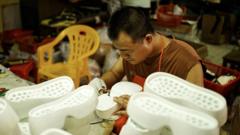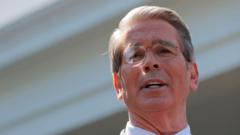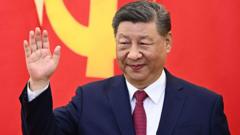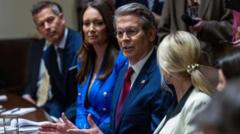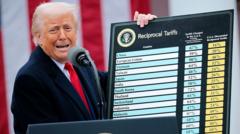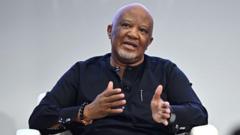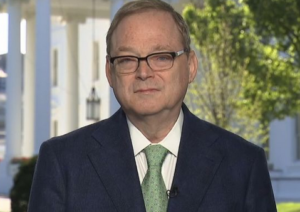Workers express fears over jobs and local businesses as tariffs threaten a deep-rooted industry.
**Windsor Auto Workers Face Uncertain Future Amid U.S. Tariffs**
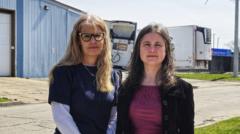
**Windsor Auto Workers Face Uncertain Future Amid U.S. Tariffs**
Auto industry employees in Windsor brace for potential economic downturn as trade tensions escalate.
In the heart of Canada's automobile manufacturing, employees in Windsor, Ontario, are facing an uncertain future as a result of newly imposed U.S. tariffs on automotive imports. As workers like Kathryn Lawton and her husband reflect on their family's century-old ties to the Ford Motor Company, they voice frustration over claims that Canadian jobs are a theft from the American workforce. "These have always been Canadian jobs," Chad Lawton argued, countering U.S. President Donald Trump's assertions on trade.
Windsor is positioned close to Detroit, a city renowned for its automotive legacy, and has contributed significantly to North America's car production for over a century. While the region continues to employ thousands at Ford and Stellantis plants, the adverse impact of the U.S. tariffs looms large. A 25% tariff on vehicles made outside the U.S. accompanied by additional tariffs on steel and aluminum is beginning to affect local job security and economic stability. Lawton pointed to the shared history of the local and U.S. automobile sectors, recalling the 2008 financial crisis that devastated both sides of the border.
With around 120,000 local jobs indirectly linked to the automotive industry, anxiety and uncertainty pervade Windsor's streets. Union representative John D'Agnolo shared concerns that the current situation could lead to a recession if consumer spending declines further. “It’s created havoc,” he stated, with prescriptions for local residents to cut back on spending to prioritize essential needs like food and rent.
At Stellantis, Austin Welzel expressed feelings of betrayal amid the trade war with the U.S., emphasizing that the tariffs have shattered the cooperative nature typically found within North American trade relations. Colleague Christina Grossi echoed this sentiment, acknowledging the emotional toll associated with potentially losing both occupation and purpose within her long-held career.
Political leaders in Canada have stepped forward with various commitments designed to assist the auto sector, including proposed funding to enhance competitiveness and safeguard jobs. Current Prime Minister Mark Carney has promised a C$2 billion fund while his political opponents have presented multiple strategies to cushion the fallout from U.S. tariff implications.
Local entrepreneurs, including restaurant owner Van Niforos, fear that economic hardships within the auto sector will resonate throughout Windsor's economy. Labor losses may threaten local establishments reliant on automotive worker patronage.
Chad Lawton remains cautiously optimistic, suggesting that Canadian trade negotiators might still find a path to dialogue despite the current tensions. After three decades with Ford, he reflects on how unprecedented the anxiety feels, likening it to the challenges presented by the COVID-19 pandemic but marked by even greater uncertainty. As conversations surrounding trade and economic stability unfold, the outcome for Windsor's future remains tightly entangled with the fate of the automotive industry.
Windsor is positioned close to Detroit, a city renowned for its automotive legacy, and has contributed significantly to North America's car production for over a century. While the region continues to employ thousands at Ford and Stellantis plants, the adverse impact of the U.S. tariffs looms large. A 25% tariff on vehicles made outside the U.S. accompanied by additional tariffs on steel and aluminum is beginning to affect local job security and economic stability. Lawton pointed to the shared history of the local and U.S. automobile sectors, recalling the 2008 financial crisis that devastated both sides of the border.
With around 120,000 local jobs indirectly linked to the automotive industry, anxiety and uncertainty pervade Windsor's streets. Union representative John D'Agnolo shared concerns that the current situation could lead to a recession if consumer spending declines further. “It’s created havoc,” he stated, with prescriptions for local residents to cut back on spending to prioritize essential needs like food and rent.
At Stellantis, Austin Welzel expressed feelings of betrayal amid the trade war with the U.S., emphasizing that the tariffs have shattered the cooperative nature typically found within North American trade relations. Colleague Christina Grossi echoed this sentiment, acknowledging the emotional toll associated with potentially losing both occupation and purpose within her long-held career.
Political leaders in Canada have stepped forward with various commitments designed to assist the auto sector, including proposed funding to enhance competitiveness and safeguard jobs. Current Prime Minister Mark Carney has promised a C$2 billion fund while his political opponents have presented multiple strategies to cushion the fallout from U.S. tariff implications.
Local entrepreneurs, including restaurant owner Van Niforos, fear that economic hardships within the auto sector will resonate throughout Windsor's economy. Labor losses may threaten local establishments reliant on automotive worker patronage.
Chad Lawton remains cautiously optimistic, suggesting that Canadian trade negotiators might still find a path to dialogue despite the current tensions. After three decades with Ford, he reflects on how unprecedented the anxiety feels, likening it to the challenges presented by the COVID-19 pandemic but marked by even greater uncertainty. As conversations surrounding trade and economic stability unfold, the outcome for Windsor's future remains tightly entangled with the fate of the automotive industry.






